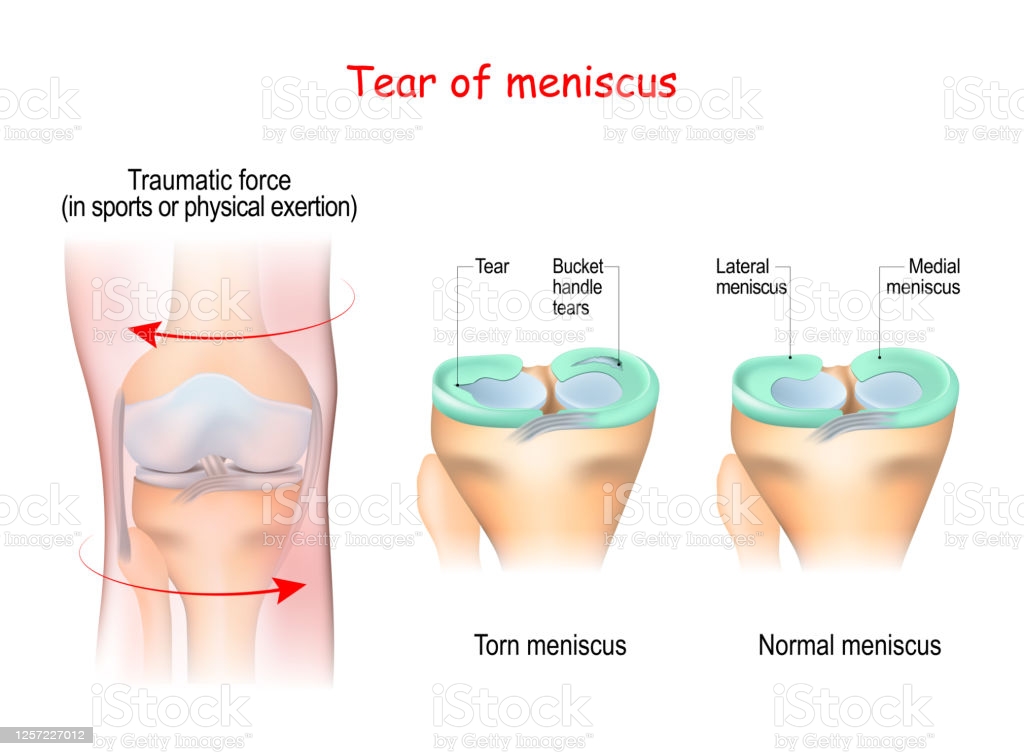A Study on Diagnosis Value Of Clinical Composite Tests to Reduce the Financial Burdens for Patients in Need
Magnetic resonance imaging (MRI) has proven to be a highly reliable diagnostic technique for meniscal injuries. MRIs are expensive and can be cost prohibitive for many patients. Now Dr. Tran Trung Dung of VinUniversity and his colleagues at Viet Duc Hospital (Hanoi) conducted a case series report to prove that that combining separate clinical tests into a single composite one can have a diagnostic value that is comparable to MRI scans. This could mean that surgeons could choose between ordering an MRI scan or a composite test in meniscal tear diagnosis and surgery procedures thereby making a diagnostic technique affordable to those with budgetary constraints..

Picture 1: Tear of meniscus (Source: Getty Image/iStockphoto)
Diagnosis plays a role in assisting surgeons in providing suitable and prompt treatment options for meniscal tears in knee injuries and knee surgery procedures. Consequently, a combination of clinical examinations and MRI scans have been frequently used to detect torn meniscus with different levels of reliability. Studies have shown that separate clinical tests are typically unreliable and show a lot of variability, therefore have have limited diagnosis value. Therefore, MRI scans, with an accuracy rate of more than 85%, have come to be widely regarded as the major approach for identifying meniscus tears, according to numerous researchers (J.C Nguyen et al, 2014 & R. Crawford et al, 2007). However, P. Antinolfi et al. demonstrated in 2017 that doing a “composite test” (combining at least two tests) can considerably improve the sensitivity and specificity compared to each clinical test alone, potentially competing with the MRI’s current role.
The team at VinUniversity and Viet Duc University Hospital (Hanoi) put this theory to the test. From April 2017 to June 2018 at , Dr. Dung and his colleagues conducted a case series with 50 patients diagnosed with an ACL injury who potentially suffered from meniscal tears.
For each patient, the clinical team examined their meniscal injury with four clinical tests both individually and in combination, in addition to conducting the MRI scans alone. As expected, doctors found that the MRI results outperformed all the individual tests in terms of sensitivity, specificity, and accuracy. However, they found no statistically significant difference between MRI and the composite test. As such, this result potentially helps surgeons to decide on performing MRI scans or a composite test to release financial burdens for patients.


Picture 2&3: Test Results of individual test, composite test and MRI scans in Dr. Dung’s series case report
(Source: International Journal of Surgery Case Report 88 (2021) 106492)
Dr. Dung said: “To obtain more thorough results, we plan to perform such individual and in-combination tests ion a larger scale with more patients who are at risk of meniscal tear. Although MRI image is still a standard for diagnosis, this research gives us hope that combining traditional clinical tests can be a reliable diagnosis tool before resorting to more expensive techniques.”
It is believed that if further research involving a larger number of patients yields a similar outcome, accurate diagnosis of injuries can be made more readily accessible to all patients and will help to improve the treatment and medical outcomes for a larger population.
You can read the whole study at this LINK.
By Nguyen Minh Phuong
__________________________
References:
- J.C Nguyen, A.A. De Smet, B.K.Graf, H.G.Rosas (2014), MR Imaging-based diagnosis and classification of meniscal tears, RadioGraphics, 34 (4), 981-999.
- R.Crawford, G. Walley, S. Bridgman, N. Maffulli (2007), Magenic resonance imaging versus arthoscopy in the diagnosis of knee pathology, concentrating on meniscal lesions and ACL tears: a systematic review, Br. Med. Bull. 84 (1), 5-23.

![[Job opportunity] Finance Support Officer](https://vinuni.edu.vn/research/wp-content/uploads/2025/12/DSF3880-300x207.jpg)

